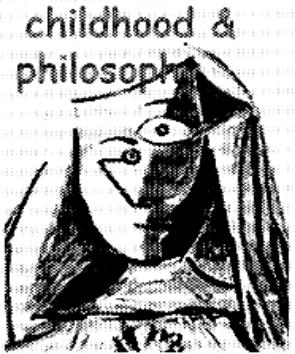training preschool education students to listen philosophically to children
DOI:
https://doi.org/10.12957/childphilo.2025.88813Keywords:
listening, preschool education, teachers’ training, emergent philosophizing, philosophy for/with children (p4wc)Abstract
This paper presents a qualitative study exploring how training in philosophical listening enhances student-teachers’ capacity to identify and engage with young children’s philosophical moments. This is part of a larger research (2021–2022) in local kindergartens in Rethymno, Crete, Greece, however the findings presented in this paper are published for the first time. The study involved 125 second-year undergraduate student-teachers completing semester-long internships as part of their Bachelor of Arts program in Preschool Education at the University of Creta. Through structured laboratory sessions, student-teachers were trained to observe children’s dialogues attentively, identify abstract concepts, and frame philosophical questions. Observations targeted moments in children’s conversations that revealed critical thinking, originality, and collaborative reasoning. The findings highlight the transformative potential of this training. Student-teachers exhibited an increased sensitivity to listening and identifying philosophical elements in children's comments, as well as the ability to design activities that foster deeper inquiry. Reflections on their role revealed the importance of balancing teacher intervention with creating space for children’s self-regulation. This study emphasizes the value of integrating philosophical practices into teacher training. It highlights how equipping future educators with the skills for attentive listening and inquiry facilitation can nurture children’s reasoning capabilities and promote meaningful dialogue in early childhood education.
Downloads
References
Barrow, W. (2010). Dialogic, participation and the potential for Philosophy for Children. Thinking Skills and Creativity, 5(2), 61–69.
Cam, P. (2006). Twenty thinking tools. ACER Press.
Cam, P. (2020). Philosophical Inquiry: Combining the Tools of Philosophy with Inquiry-based Teaching and learning. Rowman & Littlefield.
Canuto, A. T. (2015). Reflections on Theory and Pedagogy of Challenges in Facilitating Children’s Dialogues in the Community of Inquiry. International Journal of Whole Schooling, 11(1), 1–15.
Chetty, D. (2014). The elephant in the room: Picturebooks, philosophy for children and racism. childhood & philosophy, 10, 11–31.
Chetty, D., & Suissa, J. (2017). No go areas’: Racism and discomfort in the community of inquiry. In M. R. Gregory, J. Haynes, & K. Murris (Eds), The Routledge International Handbook of Philosophy for Children (pp. 11–18). Routledge.
Daniel, M., Lafortune, L., Pallacio, R., Splitter, L., Slade, C. & De la Garza, T. (2005). Modeling the development process of dialogical critical thinking in pupils aged 10 to 12 years, Communication Education, 54(4), 334–354.
Deleuze, G. (1964). Difference and Repetition. Colombia University Press.
Demozzi, S., & Ilardo, M. (2020). Educational deontology in the community of philosophic inquiry. childhood & philosophy, 16, 1–16.
Egan, K. (1988). Primary Understanding: Education in Early Childhood. Routledge.
Egan, K. (1993). The other half of the child. In M. Lipman (Ed.), Thinking Children and Education (pp. 301–305). Kendall/Hunt Publishing Company.
Fiumara, G. C. (1995). The other side of language. Routledge.
Gregory, M. (2009). Why We Should Do Philosophy with Children. Philosophy Now, (75), 12–14.
Hand, M. (2009). Can children be taught philosophy? In M. Hand & C. Winstanley (Eds.), Philosophy in Schools (pp. 3–18). Continuum.
Haynes, J. (2008). Children as philosophers: learning through enquiry and dialogue in the primary classroom (2nd ed.). Routledge.
Haynes, J., & Kohan, W. (2018). Facilitating and difficultating. The cultivation of teacher ignorance and inventiveness. In K. Murris & J. Haynes (Eds.), Literacies, Literature and Learning. Reading Classrooms Differently (pp. 204–220). Routledge.
Haynes, J., & Carvalho, M. (2023). An open-ended story of some hidden sides of listening or (what) are we really (doing) with childhood? childhood & philosophy, 19, 1–26.
Johansson, V. M. (2022). Pedagogical immediacy, listening, and silent meaning: essayistic exercises in philosophy and literature for early childhood educators. childhood & philosophy, 18, 1–29. doi: 10.12957/childphilo.2022.66527
Kennedy, D. (1999). Philosophy for Children and the Reconstruction of Philosophy. Metaphilosophy, 30(4), 338–359.
Kennedy, D. (2015). Practicing philosophy of childhood: Teaching in the (r)evolutionary mode. Journal of Philosophy of Schools, 2(1), 26–39.
Kenyon, E. (2019). Bringing undergraduates to preschool: An Ethics course for the very young. In T. Wartenberg (Ed.), Philosophy in classrooms and beyond (pp. 1–17). Rowman and Littlefield.
Kizel, A. (2016). Philosophy with Children as an educational platform for self-determined learning. Cogent Education, 3(1). https://doi.org/10.1080/2331186X.2016.1244026
Kohan, W. O., Santi, M., & Wozniak, J. T. (2017). Philosophy for teachers. Between ignorance, invention and improvisation. In M. R. Gregory, J. Haynes, & K. Murris (Eds.), The Routledge International Handbook of Philosophy for Children (pp. 253–259). Routledge.
Laverty, M. (2004). Philosophical dialogue and ethics: redefining the virtues. International Journal of Applied Philosophy, 18(2), 189–201.
Lipman, M. (2003). Thinking in education (2nd ed.) Cambridge University Press.
Lone, J. M. (2021). Seen and not Heard. Why children’s voices matter. Rowman & Littlefield Publishers.
Matthews, S, G. 1980. Philosophy and the young child. Cambridge, Mass.; London: Harvard University Press.
Murris, K. (2016). The Posthuman Child: Educational Transformation through Philosophy with Picturebooks. Routledge.
Nikolidaki, S. (2018). The importance of listening to philosophy that comes from children, Proceeding of the XXIII world congress of philosophy, 43, 95–100.
Nikolidaki, S. (2022, August 8-11). Emergent philosophizing in and out of a kindergarten classroom. Paper presented at the 20th Biennial International ICPIC conference titled Philosophy in and beyond the classroom: P4wC across cultural, social and political differences, Tokyo, Rikkyo University.
Nikolidaki, S. (2023). Listening philosophically: Developing an ear for emergent philosophising. Journal of Philosophy in Schools, 10(2) https://doi.org/10.46707/jps.v10i2.195
Sasseville, M. (1994). Self-esteem, Logical Skills, and Philosophy for Children. Thinking: The Journal of Philosophy for Children, 11(2), 11–14.
Splitter, L. J., & Sharp, A. M. (1995). Teaching for Better Thinking: The Classroom Community of Inquiry. ACER Press.
Spyrou, S. (2016). Researching children’s silences: Exploring the fullness of voice in childhood research. Childhood, 23(1), 7–21. https://doi.org/10.1177/0907568215571618
Theodoropoulou, E., & Nikolidaki, S. (2017). The emergence of emergent philosophizing.Preliminary notes. childhood & philosophy, 13(26), 153–165.
Trickey, S., & Topping, K. J. (2006). Collaborative Philosophical Enquiry for School Children: Socio-emotional effects at 11 to 12 Years. School Psychology International, 27(5), 599–614.




